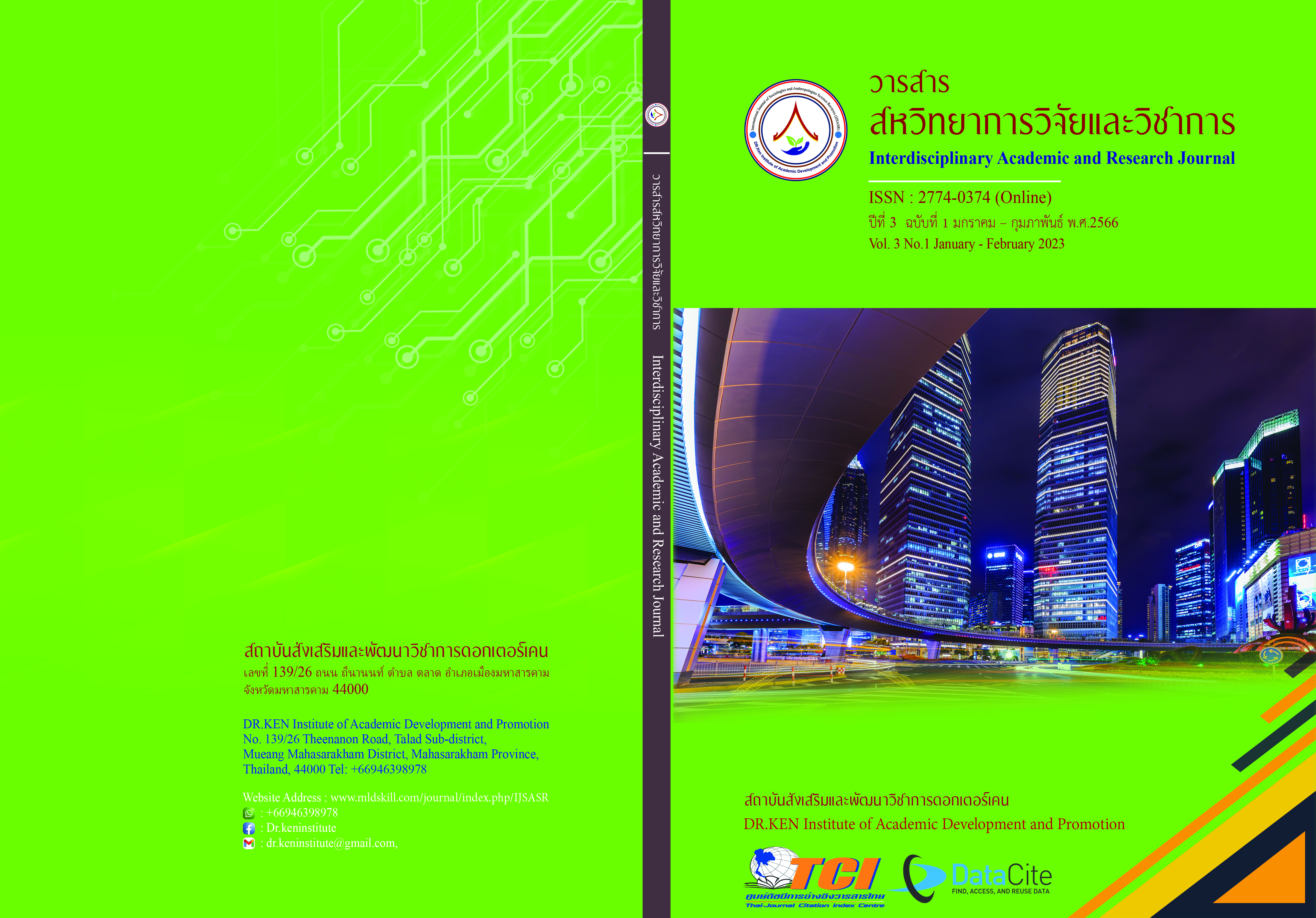The Relationship Between Technological Leadership of School Administrators and Technology Integration of Teachers in Schools under the Office of Roi Et Secondary Educational Service Area
DOI:
https://doi.org/10.14456/iarj.2023.30Keywords:
Technological Leadership; , Technology IntegrationAbstract
From the current social context, it is clear that our world has entered a completely digital age, making education management necessary to use technology to support learning management because learning in the digital age has changed in terms of The role of the learner. At present, there are many types of media used for teaching and learning by teachers having the ability to integrate the knowledge of technology necessary to promote and develop knowledge and the ability to convey content as a method. The process or practice of teachers in organizing teaching and learning activities for students. Therefore, the subject research aims to (1) Study the technological leadership of school administrators. (2) Study the integration of teachers' technology in educational institutions. And (3) to study the relationship between the technological leadership of school administrators and the technology integration of teachers in educational institutions. The population used in the research was 2,481 school personnel under the Secondary Education Service Area Office Roi Et in the academic year 2022. A sample of 335 people using the sample size table of Krejcie & Morgan. Statistics used for data analysis were frequency, percentage, mean, and standard deviation. The results showed that (1) The results of the study of the technological leadership of school administrators and the integration of teachers' technology in educational institutions were at a high level overall. (2) The results of the study of the integration of technology of teachers in educational institutions as a whole have been carried out a lot. (3) The results of the study of the relationship between the technological leadership of school administrators and the integration of technology of teachers in all aspects of education were positively correlated at a high level.
References
กนกวรรณ โพธิ์ทอง และคณะ. (2559). ผลของภาวะผู้นำทางเทคโนโลยีของผู้บริหารโรงเรียนและบรรยากาศโรงเรียน โดยมีการรู้เทคโนโลยีและการบูรณาการเทคโนโลยีในการสอนของครูเป็นสื่อกลาง ต่อประสิทธิผลครูในโรงเรียนดีศรีตำบล ระดับมัธยมศึกษาสังกัดสำนักงานคณะกรรมการการศึกษาขั้นพื้นฐาน. วารสารวิชาการมหาวิทยาลัยอีสเทิร์นเอเชีย ฉบับวิทยาศาสตร์และเทคโนโลยี. 10 (3), 255-269.
จินตวีร์ คล้ายสังข์. (2555). Desktop Publishing สู่ e-book เพื่อส่งเสริมการใฝ่รู้ของผู้เรียนยุคดิจิทัล. กรุงเทพฯ : สำนักพิมพ์แห่งจุฬาลงกรณ์มหาวิทยาลัย. พิมพ์ครั้งที่ 1.
นันทวัน พัวพัน. (2562). การพัฒนารายวิชาการสอนแนวใหม่ที่ส่งเสริมความรู้เนื้อหาผนวกวิธีสอนและเทคโนโลยีของนักศึกษาครูวิทยาศาสตร์ : การวิจัยปฏิบัติการเชิงวิพากษ์แบบมีส่วนร่วม.การศึกษาดุษฎีบัณฑิต สาขาวิชาสาขาวิทยาศาสตร์ศึกษา. มหาวิทยาลัยนเรศวร.
นิคม นาคอ้าย. (2549). องค์ประกอบคุณลักษณะผู้นำเชิงอิเล็กทรอนิกส์และปัจจัยที่มีอิทธิพลต่อประสิทธิผล ภาวะผู้นำเชิงอิเล็กทรอนิกส์สำหรับผู้บริหารสถานศึกษาขั้นพื้นฐาน. วิทยานิพนธ์ปริญญา การศึกษาดุษฎีบัณฑิต, สาขาวิชาการบริหารการศึกษา : มหาวิทยาลัย ศรีนครินทรวิโรฒประสานมิตร.
บรรจบ บุญจันทร์. (2554). โมเดลสมการโครงสร้างภาวะผู้นำเชิงเทคโนโลยีของผู้บริหารสถานศึกษาขั้นพื้นฐาน. วิทยานิพนธ์ปรัชญาดุษฎีบัณฑิต สาขาวิชาการบริหารการศึกษา : บัณฑิตวิทยาลัยมหาวิทยาลัยขอนแก่น.
พฤทธิ์ ศิริบรรณพิทักษ์. (2561). การพัฒนากลไกขับเคลื่อนระบบการผลิตและพัฒนาครูสมรรถนะสูงสำหรับประเทศไทย 4.0. กรุงเทพฯ : สำนักงานเลขาธิการสภาการศึกษา.
ภาคภูมิ งอกงาม. (2556). การศึกษาคุณลักษณะภาวะผู้นำเชิงอิเล็กทรนิกส์ของผู้บริหารระดับกลางโรงเรียนในฝัน จังหวัดอ่างทอง. สารนิพนธ์ กศ.ม. (การบริหารการศึกษา).
วรัฏฐา จงปัตนา. (2562). การวิเคราะห์ความต้องการจา เป็นของการพัฒนาครูโรงเรียนอนุบาลทรัพย์ปัญญาตามแนวคิดภาวะผู้นา เชิงเทคโนโลยี. วารสารอิเล็กทรอนิกส์ทางการศึกษา(OJED) คณะครุศาสตร์ จุฬาลงกรณ์มหาวิทยาลัย, 14(2), 1-12.
วิจารณ์ พานิช. (2557). การเรียนรู้เกิดขึ้นอย่างไร. พิมพ์ครั้งที่ 2. กรุงเทพฯ : มูลนิธิสยามกัมมาจล.
สมหมาย อ่ำดอนกลอย. (2556). บทบาทผู้บริหารสถานศึกษาในศตวรรษที่ 21. วารสารมนุษยศาสตร์และสังคมศาสตร์ มหาวิทยาลัยราชภัฏพิบูลสงคราม. 7(1), 1-7.
สำนักงานเขตพื้นที่การศึกษามัธยมศึกษาร้อยเอ็ด. (2564). ข้อมูลบุคลากรสำนักงานเขตพื้นที่การศึกษามัธยมศึกษาร้อยเอ็ด. ร้อยเอ็ด: สำนักงานเขตพื้นที่การศึกษามัธยมศึกษาร้อยเอ็ด,
สุกัญญา แช่มช้อย. (2558). ภาวะผู้นำทางเทคโนโลยี: การนำเทคโนโลยีสู่ห้องเรียนและโรงเรียนในศตวรรษที่ 21. วารสารศึกษาศาสตร์ มหาวิทยาลัยนเรศวร. 16(4), 216 – 224.
สุกัญญา แช่มซ้อย. (2561). การบริหารสถานศึกษาในยุคดิจิทัล. กรุงเทพมหานคร: โรงพิมพ์แห่งจุฬาลงกรณ์มหาวิทยาลัย.
สุนันทา สมใจ และวิชุดา กิจธรธรรม. (2561). การบริหารสถานศึกษาด้วยภาวะผู้นำทางเทคโนโลยี. วารสาร วิทยาลัยดุสิตธานี. 12 (1), 350-363.
หนูม้วน ร่มแก้ว. (2547). ความรู้เบื้องต้นในการวิจัยเทคโนโลยีการศึกษา. คณะคุรุศาสตร์ มหาวิทยาลัยราชภัฏเชียงใหม่.
อิทธิฤทธิ์ กลิ่นเดช. (2560). ความสัมพันธ์ระหว่างภาวะผู้นำเชิงเทคโนโลยีกับการบริหารงานวิชาการของผู้บริหารสถานศึกษา สังกัดสำนักงานส่งเสริมการศึกษานอกระบบและการศึกษาตามอัธยาศัยจังหวัดสระบุรี. วิทยานิพนธ์ศึกษาศาสตรมหาบัณฑิต, สาขาวิชาการบริหารการศึกษา มหาวิทยาลัยเทคโนโลยีราชมงคลธัญบุรี.
Efeoglu, C., & Coruk, A. (2019). The Relationship Between Teachers’ Attitudes Towards Educational Technologies and School Administrators’ Technology Leadership Roles. international Journal of Human and Behavioral Science, 5(2), 73-78.
Fisher, D. M. (2013). The 21st-Century Principal: A Correlational Study of Technology Leadership and Technology Integration in Texas K-12 Schools. The Office of Graduate Studies of Texas A and M University-Commerce
Koehler, M. J., & Mishra, P. (2009). What is Technological Pedagogical Content Knowledge? Contemporary Issues in Technology and Teacher Education, 9(1), 60.
Krejcie, R.V. & Morgan, D.W. (1970). Determining Sample Size for Research Activities, Journal of Education and Psychological Measurement. 30 (3), 607-610.
Raman, A., & Thannimalai, R., (2019). Importance of Technology Leadership for Technology Integration: Gender and Professional Development Perspective. SAGE Open, 1-12.
Watts, C. D. (2009). Technology Leadership, School Climate, and Technology Integration: A Correlation Study in K-12 Public Schools. Doctor of Education in the Department of Educational Leadership: University of Alabama.
Downloads
Published
How to Cite
Issue
Section
License
Copyright (c) 2023 Natchapon Putpoonga

This work is licensed under a Creative Commons Attribution-NonCommercial-NoDerivatives 4.0 International License.
Copyright on any article in the Interdisciplinary Academic and Research Journal is retained by the author(s) under the under the Creative Commons Attribution-NonCommercial-NoDerivatives 4.0 International License. Permission to use text, content, images, etc. of publication. Any user to read, download, copy, distribute, print, search, or link to the full texts of articles, crawl them for indexing, pass them as data to software, or use them for any other lawful purpose. But do not use it for commercial use or with the intent to benefit any business.
















.png)


